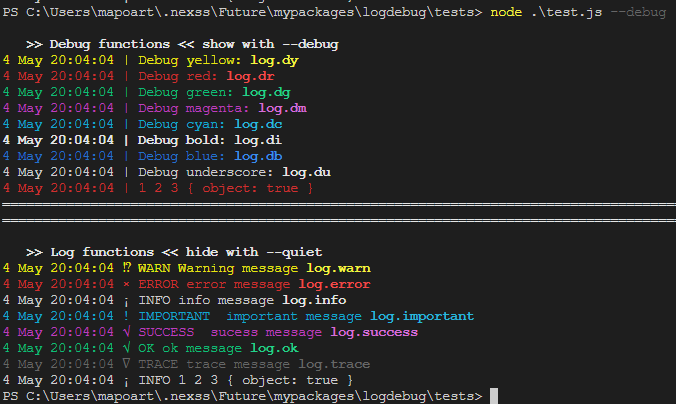@nexssp/logdebug
15.01.2022 Upgrade - Now works also with import as module.
News
- New 1.0.17: tracking functions.
--debug:all or --debug:tracker more below
More
Note: 1.0.15 Now by default all logs and debug funcs goes to stdout - except error one. To move all of them to stderr: --output:stderr
Note: 1.0.12+
Now header function is size of terminal window.
Note: 1.0.11+ See new time functions below ..
Easy loging/debuging. Going to stderr if --debug. You can change from stderr to stdout easy by another option --debug:stdout. You can disable logs just by adding --quiet. Maybe you need just debug information, combine it with --quiet --debug.
Debug and Log functions and colors

Parameters
This library is designed just to use cli process.argv directly.
- yourprogram.js --debug # will display debugging information, without it won't.
- yourprogram.js --debug:stdout # will pipe to stdout.
- yourprogram.js --quiet # will hide logs information
Examples
note: below must be run with --debug or --debug:stdio . if you add --quiet, logs will not be displayed.
const log = require('@nexssp/log')
const { bold } = require('@nexssp/ansi')
log.dy('\t Debug yellow: ' + bold('log.dy'))
log.dr('\t Debug red: ' + bold('log.dr'))
log.dg('\t Debug green: ' + bold('log.dg'))
log.di('\t Debug bold: ' + bold('log.di'))
log.db('\t Debug blue: ' + bold('log.db'))
log.du('\t Debug underscore: ' + bold('log.du'))
log.warn('\t Warning message ' + bold('log.warn'))
log.error('\t error message ' + bold('log.error'))
log.info('\t info message ' + bold('log.info'))
log.success('sucess message ' + bold('log.success'))
log.ok('\t ok message ' + bold('log.ok'))
log.trace('\t trace message ' + bold('log.trace'))
Time options (1.0.11+)
--debug:ms
displays time from the begining.

--debug:diff
Displays difference between each log.

Usage of tracker
External Usage
const o = {
run,
start,
var1,
}
const { applyTracker } = require('@nexssp/logdebug/tracker')
applyTracker(o, null)
Composite
const { functionTracker } = require('../tracker')
function myComposite(a, b, { option1, option2 } = {}) {
const _a = a
const _b = b
const trackFunction = functionTracker('mytitle')
let myfunc2 = (param2) => {
console.log(`${_b}`, param2)
}
let myfunc1 = (param1) => {
console.log(`${_a}: ${param1}`)
myfunc2(`${_a}: ${param1}`, 'works!')
}
myfunc1 = trackFunction(myfunc1)
myfunc2 = trackFunction(myfunc2)
let o = {
myfunc1,
myfunc2,
}
return o
}
const compo = myComposite(1, 'string')
compo.myfunc1(1, 2, 3)
compo.myfunc2(1, 2, 3)






